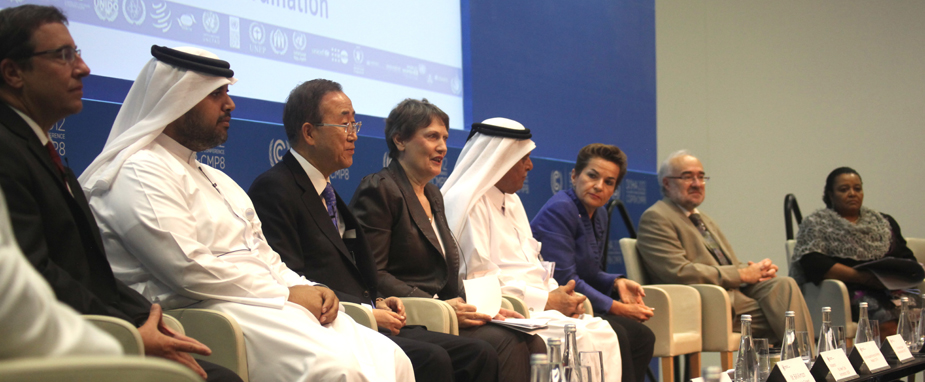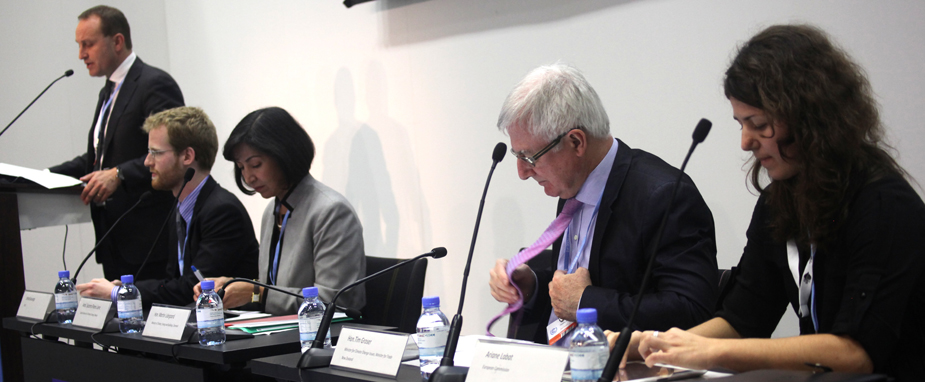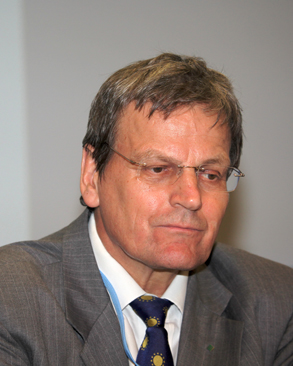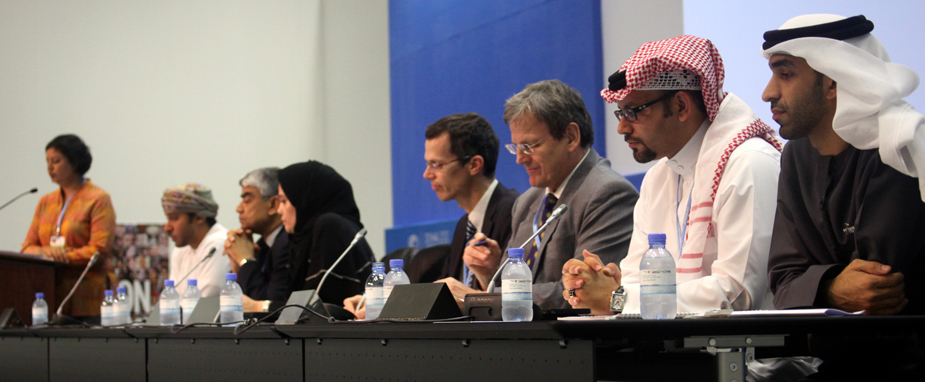|

 |
 |
 |
 |
Sustainable Solutions for Climate Action, Food Security
in Dry Lands Under a Changing Climate
Presented by the UN and Qatar
|
|
 |
 |
 |
 |
During this high-level event, moderated by Helen Clark, Administrator, UNDP, participants heard from ministers and leaders within the UN system on actions to be taken under the climate-water-food security nexus in the drylands.
Highlighting drylands as one of the most vulnerable ecological areas, Abdullah Bin Hamad Al-Attiyah, UNFCCC COP 18 President, Qatar, said that over two billion people are affected by climate-related impacts in these areas. He called on participants to consider the concerns of these people in their negotiations.
UN Secretary-General Ban Ki-moon expressed optimism that this conference will decide: a second commitment period of the Kyoto Protocol; the means to mobilize the finances for the Green Climate Fund (GCF); and short-term financing until the GCF is fully operational.
UNFCCC Executive Secretary Christiana Figueres noted the leadership of Qatar at the domestic levels and in the global community on food security. She stressed the importance of the food-water-energy nexus, highlighting this nexus is the “human face” of climate change, as well as its solution. She stressed the time for talking is over, saying it is time to move to solutions.
Fahad Bin Mohammad Al-Attiya, Chairman, Qatar National Food Security Programme, emphasized that food security has everything to do with climate change, saying that for Qatar, a net importer of food, the impact of climate on food deeply affects his country. He highlighted that Qatar is establishing a Global Dry Land Alliance to focus on this issue and engage in knowledge sharing.
Izabella Vieira Teixeira, Minister of Environment, Brazil, noted the clear messages from the UN Conference on Sustainable Development on the food-water-energy nexus and sustainable consumption and production patterns. She said the focus of Rio+20 was "the urgency of the present," noting it took a pragmatic approach. She highlighted the challenge of increasing food production in Brazil while reducing deforestation and rehabilitating degraded lands.
Edna Molewa, Minister of Water and Environmental Affairs, South Africa, spoke on actions taken by her government in response to climate change, particularly in the country’s water-scarce dryland areas. Speaking for Africa, she called for international support in technology transfer, and predictable and adequate financing to increase food and water security.
Rachel Kyte, Vice-President, World Bank, stressed the need to invest in agricultural research to help smallholder farmers access drought and disease-resistant crop varieties. Noting the current volatility in world food prices, she called for the establishment of viable, functioning social safety nets to allow people to withstand the climate change impacts already being experienced.
Benedito Braga, President, World Water Council (WWC), emphasized the need for supply- and demand-side measures to address water challenges and adapt the water sector to climate change. He called for negotiators under the UNFCCC to bring water into the discussion, in order to add urgency to the process, and for developing a sustainable development goal (SDG) on climate-adaptive water strategies.
Michel Jarraud, Secretary-General, World Meteorological Organization (WMO), underscored high levels of water stress in many countries and noted climate change will increase water variability, further heightening vulnerability. He called for translating climate data into usable forms for policymakers or individual farmers and fishers, noting the development of the new Global Framework for Climate Services.
Kieren Keke, Minister of Foreign Affairs, Nauru, said that small island developing states (SIDS) face similar challenges in food and water security as countries with drylands.
Achim Steiner, Executive Secretary, UNEP, said that the role of his organization is "to speak truth to power." He lamented that the negotiators have ignored climate science. He also challenged popular thinking of the pathways to industrial growth, noting this growth can occur in a sustainable, green manner. |
 |
 |
 |
 |
 |
Panel (L-R): Achim Steiner, Executive Director, UNEP; Fahad Bin Mohammed Al-Attiya, Chairman, Qatar National Food Security Programme; Ban Ki-moon, UN Secretary-General; Moderator Helen Clark, Administrator, UNDP; Abdullah Bin Hamad Al-Attiyah, UNFCCC COP 18 President, Qatar; Christiana Figueres, Executive Secretary, UNFCCC; Michel Jarraud, Secretary-General, WMO; and Edna Molewa, Minister of Water and Environmental Affairs, South Africa.
|
|
 |
 |
 |
 |
Co-moderated by Martin Lidegaard, Minister of Climate, Energy and Buildings, Denmark, and Tim Groser, Minister of Trade and Climate Change, New Zealand, this event discussed inter alia: the removal of fossil fuel subsidies; political sensitivities; communication strategies; and case-study experiences. Lidegaard introduced the event, noting that while fossil fuel subsidies are assumed to be socially beneficial and facilitate economic growth, they have environmental, social and economic consequences. He emphasized the need to engage legal players and key stakeholders, to incorporate innovative regulatory models and to involve civil society.
Groser highlighted the participation of a number of countries in the Friends of Fossil-Fuel Subsidy Reform, including: Costa Rica; Denmark; Ethiopia; Finland; New Zealand; Norway; Sweden; and Switzerland. He stated that this group does not want to “push extremism” on the issue, rather it aims to provide direction, encouragement and incentives for reform.
Ambassador Socorro Flores Liera, Special Advisor for Climate Change, Foreign Ministry, Mexico, highlighted studies that demonstrate subsidies reduce energy security and impede investments in clean energy. She noted efforts to address these concerns in the latest G20 meeting, including a voluntary peer-review process, and stressed the need to involve developing countries in the discussion.
Ariane Labat, European Commission, introduced existing efforts to phase down subsidies for fossil fuel production in Europe, stressing policy and social challenges, and discussed how the reduction of fossil fuel subsidies influences other taxes.
Jehan Sauvage, Organisation for Economic Co-operation and Development (OECD), introduced existing approaches to inventory budgetary support and tax expenditures for fossil fuel subsidies, and called for transparency in the process.
Kerryn Lang, International Institute for Sustainable Development (IISD), discussed a guidebook collating international best practices on fossil fuel subsidy reform, which addresses getting energy prices right, managing the impacts of policy reform and building support for reform. She stressed the need to engage and inform civil society actors.
Rob Bradley, Ministry of Foreign Affairs, United Arab Emirates, highlighted existing fossil fuel subsidy reform in the United Arab Emirates, but noted it is a politically sensitive issue. He also acknowledged that in the Gulf Cooperation Council (GCC) region, oil extraction is inexpensive and thus its affordability is not due to subsidy support.
Rene Castro, Minister of Environment, Costa Rica, underscored Costa Rica’s strategy to cut fossil fuel subsidies in the electricity and transportation sector, leading to the cost-competitiveness of renewable energy and its greater use.
During discussions, participants emphasized, inter alia: the need for open dialogue on this reform strategy; possible economic, environmental and social benefits from the redistribution of subsidies; the need to take a long-term and responsible approach on reform; a focus on transparency; and the engagement of more countries in the initiative. Participants also discussed how to engage civil society and support small-business owners or other stakeholder groups that could be negatively impacted. |
 |
 |
 |
 |
 |
Panel (L-R): Martin Lidegaard, Minister of Climate, Energy and Buildings, Denmark; Jehan Sauvage, OECD; Ambassador Socorro Flores Liera, Special Advisor for Climate Change, Foreign Ministry, Mexico; Tim Groser, Minister of Trade and Climate Change, New Zealand; and Ariane Labat, European Commission.
|
|
 |
 |
 |
 |
 |
 |
 |
 |
The Emissions Gap, Its Implications and Policy Solutions
Presented by the UNFCCC Secretariat and European Climate Foundation (ECF)
|
|
 |
 |
 |
 |
Moderator Bert Metz, ECF, introduced the panel, which focused on key messages and national responses to the UN Environment Programme’s (UNEP) report, titled “The Emissions Gap Report 2012: A UNEP Synthesis Report,” launched shortly before COP 18. Halldor Thorgeirsson, UNFCCC Secretariat, co-moderated the session, noting the report takes two initial steps, to focus on the gap and identify solutions to bridging the gap, and that the challenge now is to take the third step, of implementation.
Achim Steiner, Executive Director, UNEP, emphasized current commitments will not limit temperature increases to 2°C, saying countries are taking another step down the wrong trajectory. He highlighted that transformational change is underway at local levels, but underscored that individual actions cannot be scaled up fast enough, deeming the international climate process necessary to ensure the transition is faster and “scalable.”
Explaining that different pathways of annual emissions can lead to the same cumulative temperature impact, Joseph Alcamo, UNEP, summarized the findings of the report, noting: the 39 pathways outlined in the report all require global emissions to peak before 2020; even under the most ambitious current emissions reductions pledges, the gap will be 8 Gt/year by 2020; and there are significant opportunities to close the gap, with the emissions reduction potential across seven sectors projected to lead to a 17 Gt/year reduction by 2020.
In the high-level panel segment, Fatou Gaye, Minister of Forestry and the Environment, the Gambia, underscored the importance of rapid emissions reductions, noting Least Developed Countries would be disproportionately affected by a warmer world, and stressed the need for a 1.5°C temperature cap. Martin Lidegaard, Minister for Climate, Energy and Buildings, Denmark, stressed this report is “very bad news,” called for a faster transition, and said the most important outcomes of COP 18 include addressing the emissions gap and mobilizing finance at the scale needed to make the low-carbon transition possible in developing countries.
Parliamentary State Secretary Katherina Reiche, Germany, called the report a “wake-up call,” offering four suggestions on how to achieve greater reductions: to fully implement existing mitigation pledges; to raise the ambition of and remove conditions on existing pledges; to secure new pledges from countries currently without pledges; and to develop complementary actions, such as international cooperative initiatives on REDD+. Ali Mohammed, Permanent Secretary of the Environment and Mineral Resources, Kenya, called on large emitters to take responsibility and stop the “blame game,” but added that collective efforts are needed for mitigation and adaptation, outlining his country’s activities towards a low-carbon climate-resilient economy.
Judy Beaumont, Deputy Director-General, Department of Environmental Affairs, South Africa, called for building trust among parties as a key measure towards achieving greater emissions reduction ambition, and outlined relevant discussions linked to mitigation under all thematic areas and working groups of the UNFCCC, including the Ad Hoc Working Group on Long-term Cooperative Action and the Ad Hoc Working Group on the Durban Platform.
During discussions, participants considered: how to address complementary issues such as the green economy, which are not integrated into the UNFCCC; implications of carbon capture and storage (CCS) and biomass regarding environmental integrity; possible global energy mix targets; and how countries are including climate actions in national financial budgets for 2013-2020. |
 |
 |
 |
 |
Energy and Climate: From Current Trends to
an Effective
Response to the Climate Challenge
Presented by the International Energy Agency (IEA) |
|
 |
 |
 |
 |
This session, moderated by Christina Hood, IEA, focused on the links between energy systems and climate, with a focus on the need to improve energy efficiency to reach climate targets and the role of natural gas in a decarbonized energy sector.
Laura Cozzi, IEA, outlined the key messages from the latest IEA World Energy Outlook (WEO). Noting that the foundations of the global energy system are shifting, she highlighted the resurgence of oil and gas in unexpected places, owing to the development of unconventional oil and gas, and lauded signs of an increasing focus on energy efficiency, as evidenced by national policy development. Pointing to the role energy efficiency can play in transforming the energy sector, she highlighted that two-thirds of the economic potential of energy efficiency remains untapped, noting policy barriers to its implementation. Cozzi also discussed the role of natural gas in future energy and emissions projections, calling unconventional gas a “game changer,” with the potential to unlock new energy market routes and affect price and demand for other energy sources. Noting the lower emissions of gas compared with coal, she cautioned that unconventional gas has higher emissions than conventional gas and underscored that natural gas alone does not provide the solution to remaining under the 2°C target.
Philippe Benoit, IEA, discussed the barriers to reaching the untapped potential of energy efficiency, articulating some of the steps needed for its realization, including quantifying its multiple benefits and financing projects. He suggested focusing on three “As”: assessment of energy efficiency activities; adjustment of programs and policies in response to assessments; and adaptation of policies and technologies to the changing landscape of energy consumption. He presented the IEA’s Energy Sector Carbon Intensity (ESCI) indicator to track the carbon intensity of global energy use, noting the intensity had remained steady at 2.38 tonnes of CO2 per tonne of oil equivalent in spite of efforts to reduce carbon consumption, and would need to decrease to 1.4 by 2030 and 0.9 by 2050 to meet the 2°C target.
Participants then discussed: assumptions made in energy efficiency studies of the WEO; updated publications, given the rapidly-changing markets in natural gas and other fuels; IEA’s energy efficiency projects; the durability of energy efficient products and whether they offer long-term savings; details on fossil fuel subsidies and the IEA’s role in addressing these; CCS, including its technological potential; IEA’s plans to support the implementation of new and additional measures to close the emissions reduction gap; and infrastructural lock-in. |
 |
 |
 |
 |
High Level Seminar on Climate Change and South-South
Cooperation
Presented by the Department of Climate Change,
National Development and Reform Commission (NDRC), China
|
|
 |
 |
 |
 |
Moderated by Huang Wenhang, NDRC, this event featured ministerial statements, as well as statements from Chinese industry on South-South cooperation. Participants witnessed an acceptance ceremony for the provision of goods to Ethiopia’s Environment Protection Authority (EPA) under NDRC’s South-South cooperation programme.
Xie Zhenhua, Vice-Chairman, NDRC, lauded his country's South-South cooperation efforts on climate change, including capital and technical assistance. He outlined some of the efforts of his government in promoting climate change resilient technologies in developing countries, noting that China has dedicated US$200 million per year to address climate change.
Helen Clarke, Administrator, UNDP, noted her organization’s objective is to assist developing countries to meet the targets they have set for themselves, including those that will take them on a path to sustainability. She stressed that South-South cooperation will play a big role in financing for climate change.
Tewolde Berhan, Director-General, EPA, Ethiopia, lauded the efforts of the Chinese government in providing technical assistance to developing countries, and informed participants of his country’s plan to be carbon neutral by 2025.
Welcoming his country’s partnership with China and calling for a strong outcome in Doha, George Prime, Minister of Environment, Export Development and Foreign Aid, Grenada, informed participants that his country is the first recipient of climate-resilient technology through China’s South-South cooperation programme.
Hasan Mahmoud, Minister of Environment and Forests, Bangladesh, underlined that the aspirations of people in the global south for better living conditions should not be curtailed by moves towards green development. He highlighted his country’s efforts to achieve 10% energy production from renewable energy by 2020.
Amjad Abdulla, Maldives, spoke on his country’s partnership with the Chinese government, including a Memorandum of Understanding on mitigation actions. He welcomed strengthened efforts towards South-South cooperation and called for a greater focus on adaptation.
Speaking for Chinese industry, Wang Zhongfu, China Potevio Corporation, and Wan Chuhui, Haier Group, called for greater information exchange between Chinese corporations and those in the rest of the developing world. They highlighted their companies’ efforts in promoting green growth, particularly through corporate social responsibility.
In the next session, Wenhang introduced the NDRC’s actions on South-South cooperation, outlining the NDRC’s initiatives on renewable energy, and sustainable development in developing countries. She said Chinese support included capital and technical assistance, training and technology transfer. Shi Weina, NDRC, spoke on training programmes on climate change mitigation that the Chinese government has for other developing countries.
During discussions, participants raised questions on: whether local communities participate in the adaptation strategies in China, especially during the restoration of grasslands; the need for community participation in national-level climate change measures; and the need for China to consider this in South-South approaches. |
 |
 |
 |
 |
Renewable Energy Prospects in the GCC Region and Technology Partnerships
Presented by the International Renewable Energy Agency (IRENA),
Saudi Arabia and Fraunhofer Institute for Solar Energy Systems (ISE)
|
|
 |
 |
 |
 |
|
 |
 |
 |
 |
 |
| Eicke Weber, Director, Fraunhofer ISE, stressed a renewable energy future will balance the direct harvesting of solar, wind and other renewables, backed by a sufficient grid connection, noting Germany’s achievements with this model. |
|
 |
 |
 |
 |
|
|
This panel, moderated by Axel Michaelowa, Perspectives Climate Change (Perspectives), considered renewable energy (RE) prospects in the Gulf Cooperation Council (GCC) region, with a focus on partnerships for RE technology and country experiences.
Gauri Singh, IRENA, discussed RE in the GCC, outlining growing energy demand in the region, and noting that GCC per capita energy consumption exceeds that of larger economies, including the US and China. Underscoring the economic and environmental costs of hydrocarbon energy, she described GCC country efforts to develop RE targets and invest in research and development (R&D), manufacturing and project development.
Eicke Weber, Director, Fraunhofer ISE, suggested that instead of focusing on legally-binding targets at the COP, which send a negative message, it should focus on positive goals, including energy efficiency and renewable integration. He stated the GCC countries have the resources to move towards RE, noting that sun, sand and money are available.
Abdulrahman AlGhabban, King Abdullah City for Atomic and Renewable Energy (K.A.CARE), Saudi Arabia, said the energy mix for Saudi Arabia must be sustainable, economically viable, technically feasible and enable further growth. AlGhabban highlighted Saudi Arabia’s roadmap leading to 2032, and stated that in 2013 they hope to witness the launch of RE pilot projects.
Ibrahim Abdel Gelil, Arabian Gulf University, Bahrain, discussed market and non-market barriers to RE development, notably subsidies which send the wrong signals to consumers, a lack of legislation and institutional fragmentation.
Underscoring that Oman is ranked among the top 10 solar intense countries in the world, Abdullah Al Zakwani, Executive Director, Industrial Innovation Center, Oman, described his country’s efforts with solar power development, outlining pilot projects on concentrated solar power (CSP) and photovoltaic (PV) technologies. Pointing to the challenge of water limitations in developing CSP in Oman, he underscored the need to ensure technology choices in the Middle East are appropriate to the region.
Mona Al Madeed, Qatar Petroleum, discussed RE initiatives in Qatar, stating that RE is important for energy diversification. She highlighted several RE projects, including a solar technology testing project aimed at identifying technologies best suited to Qatar’s climate.
Thani Al Zeyoudi, Ministry of Foreign Affairs, United Arab Emirates, highlighted approaches in Abu Dhabi and Dubai on RE implementation, stressing lessons learned including: education and R&D; working with entrepreneurs; building awareness among policymakers and citizens about current trends and technology; and the role of regional cooperation.
During discussions, panelists responded to questions on: whether GCC countries considered submitting their RE projects as nationally appropriate mitigation actions; nuclear power development in the region, and how the cost of decommissioning plants at the end-of-life phase was factored into economic evaluations; the challenges of integrating solar and nuclear power; the role of natural gas in the future energy mix in the region; initiatives for renewable power in the city of Mecca, Saudi Arabia; and the potential for the GCC region to increase its leadership in the UNFCCC and international climate negotiations.
|
 |
 |
 |
 |
 |
Panel (L-R): Gauri Singh, IRENA; Abdullah Al Zakwani, Executive Director, Industrial Innovation Center, Oman; Ibrahim Abdel Gelil, Arabian Gulf University, Bahrain; Mona Al Madeed, Qatar Petroleum; Axel Michaelowa, Perspectives; Eicke Weber, Director, Fraunhofer ISE; Abdulrahman AlGhabban, K.A.CARE, Saudi Arabia; and Thani Al Zeyoudi, Ministry of Foreign Affairs, United Arab Emirates.
|
|
 |
 |
 |
 |
 |
The Earth Negotiations Bulletin on the side (ENBOTS) © <enb@iisd.org> is a special publication of the International Institute for Sustainable Development (IISD) in cooperation with the State of Qatar. This issue has been written by Tallash Kantai, Kate Neville, Anna Schulz and Anju Sharma. The Digital Editor is Kate Harris. The Editor is Liz Willetts <liz@iisd.org>. The Director of IISD Reporting Services is Langston James “Kimo” Goree VI <kimo@iisd.org>. Support for the publication of ENBOTS at the Doha Climate Change Conference - November 2012 has been provided by the State of Qatar. The opinions expressed in ENBOTS are those of the authors and do not necessarily reflect the views of IISD and funders. Excerpts from ENBOTS may be used in non-commercial publications only with appropriate academic citation. For permission to use this material in commercial publications, contact the Director of IISD Reporting Services at <kimo@iisd.org>. Electronic versions of issues of ENBOTS from the Doha Climate Change Conference - November 2012 can be found on the Linkages website at http://enb.iisd.org/climate/cop18/enbots/. The ENBOTS Team at the Doha Climate Change Conference - November 2012 can be contacted by e-mail at <anna@iisd.org>.
|
|
|